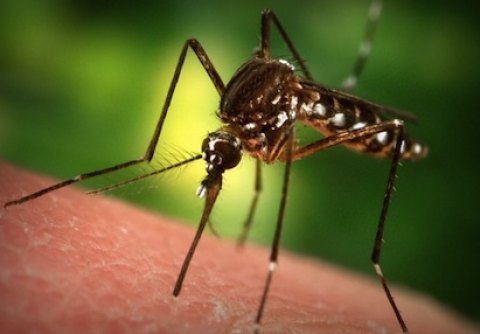Endangered Mosquito Discovered

Dr. Scratcher explained that the eggs of this mosquito have lain dormant under the sand dunes since the last ice age but beach erosion caused by global warming has brought them closer to the surface in recent months where they have been incubated by warmer-than-usual sunlight.
Because the species is so highly endangered, an emergency ordinance has been enacted which will impose a $50 fine on anyone who intentionally kills one of them.
Anopheles carolinianus looks almost identical to ordinary salt marsh mosquitoes but can be recognized by its tendency to fly a spiral pattern around the interior portions of a victim's outer ear while emitting a loud whine. While it might seem that little evolutionary advantage would accrue to a parasite which so loudly announces its presence to a host, Dr. Scratcher explained that the mosquitoes operate in pairs so that when the first mosquito is violently swatted, temporary hearing loss results which allows the second mosquito to feast unimpaired.
Not surprisingly, Dr. Scratcher's discovery has stirred up considerable controversy.
A former colleague of Dr. Scatcher's from N.C. State's Department of Entomology, Dr. Paul “Skeet” Slapper has embarked on a research project to debunk Scratcher's theory. In a recent telephone interview he said, “Scratcher wouldn't know an anopheles carolinianus if it bit him on the... ouch!”
According to Dr. Slapper, the “new” species is nothing but a common salt marsh mosquito. He sees no need to prohibit the swatting of mosquitoes.
“All in all,” he said, “the presence of humans has been a good thing for mosquitoes. The number of mosquitoes killed by swatting pales in comparison to the number who succeed in drawing blood and escaping to nourish their eggs.”
“Besides,” he added, “Scratcher's theory of the eggs being exposed by erosion is based on the highly questionable theory of 'global warming' and everyone knows there's no scientific evidence of that.”
Dr. Slapper and a team of graduate assistants have outfitted a four-wheel-drive van to explore the dunes in an effort to capture and isolate new mosquito species. Unfortunately, the expedition was denied access to the beach by park rangers. They apparently forgot to obtain an ORV permit.



